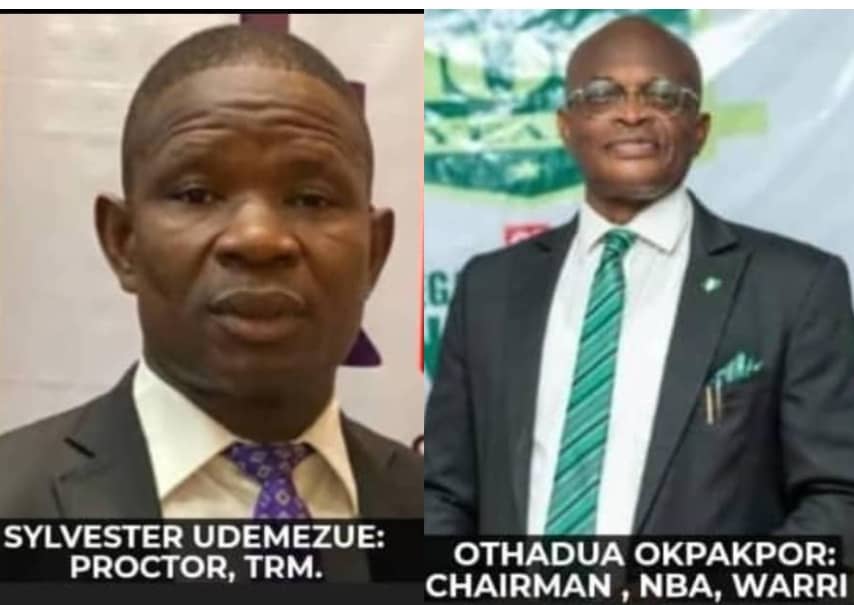A MEMO TO NBA WARRI BRANCH: A REFLECTION ON YOUR RECENT NOTICE ON ENFORCEMENT OF THE LEGAL PRACTITIONERS’ REMUNERATION ORDER 2023.
From: Sylvester Udemezue: Proctor, The Reality Ministry of Truth, Law, and Justice (TRM)
To: The Chairman and Secretary, Nigerian Bar Association, Warri Branch, Delta State, Nigeria
Date: 05 October 2025
Subject: Respectful Reflection On Your Recent Notice on Enforcement of the Legal Practitioners’ Remuneration Order 2023.
Dear Learned Colleagues, I write in the spirit of professional camaraderie, mutual respect, and constructive engagement to offer a few humble reflections on your recent “Notice to Lawyers/Clients” issued by the Nigerian Bar Association, Warri Branch, dated 1 October 2025, regarding compliance with the Legal Practitioners’ Remuneration (for Legal Documentation and Other Land Instruments) Order, 2023 (“the Remuneration Order”).
Let me first commend the Warri Branch for its commendable effort and leadership in promoting compliance with the Remuneration Order. The objective behind your initiative is noble: to uphold professional standards, restore value to legal work, and discourage the destructive culture of fee undercutting that has, unfortunately, become widespread in our profession. However, with utmost respect, I fear that the method adopted (which mirrors a similar approach earlier taken by the NBA National Remuneration Committee) may be well-intentioned but ultimately ineffective: even counterproductive. The directive, though bold, risks being largely symbolic, impracticable, and unenforceable within the current realities of Nigerian legal practice. Permit me, therefore, to outline a few reflections for your kind consideration.
1. Enforcement Practicality
The notice asserts that any lawyer who fails to comply with the Remuneration Order commits professional misconduct and may be suspended by the Legal Practitioners Disciplinary Committee (LPDC). That sounds fair in theory. But in practice, how does the Branch intend to identify defaulting lawyers? If, as experience suggests, over 95% of lawyers across Nigeria do not fully comply with the prescribed minimum fees (especially in land documentation matters), would the Branch proceed to report all such members to the LPDC? Is that feasible or even desirable? Indeed, as I argued elsewhere, this approach amounts to putting the cart before the horse. We cannot enforce what is not yet structurally workable. An unenforceable law or directive merely creates a false sense of progress (what I call “performative reform”) and leaves the system unchanged beneath the surface.
2. Feasibility and Time Frame
Even assuming such disciplinary cases are filed, how long would they take to conclude? Recall the case reported by Premium Times on 10 April 2021, titled “Assault: NBA Officers Push for CCT Chairman’s Prosecution in Fresh Petition.” Four years later, that matter was still reportedly awaiting determination. Now imagine that each of the over 130 NBA branches files just 100 complaints to the LPDC; that’s 13,000 cases nationwide. If each takes four years to resolve, how many decades would it take to conclude them all? Clearly, the LPDC, with its limited manpower and resources, would be overwhelmed. This is precisely why I have consistently advocated for systems-based reform instead of person-based enforcement. As I wrote in “Rethinking System Change in Nigeria”, no institution thrives on goodwill, threats, or mere compliance orders; only on impregnable structural mechanisms that make default impossible or unprofitable.
3. Evidential and Practical Weakness
Even if such complaints were entertained, how easy would it be to prove default? A lawyer accused of charging below the prescribed minimum could easily regularize matters by collecting any outstanding shortfall from the client, tendering a receipt, and asserting that “the client was owing but has now paid.” The case would collapse instantly. This underscores the futility of reactive enforcement: it is nearly impossible to prove an offence that can be cured by a single payment or retrospective invoice. The lesson here, as emphasized in my earlier essay titled, “Rethinking System Change”, is that laws must be self-enforcing, not self-defeating. Where compliance depends on moral persuasion or threat of punishment, the system is inherently weak and unsustainable.
4. Analogy of Futility: With respect, dragging a lawyer before the LPDC for an alleged breach of the Remuneration Order is akin to filing an objection to a landlord’s recovery-of-premises action on the ground that the landlord’s lawyer lacked written authority to issue the quit notice; only for the landlord to immediately sign the authorization, thereby curing the defect. The law does not reward procedural theatre. And in this case, what we are witnessing is precisely procedural theatre without systemic impact. It gives the appearance of reform but yields no change in the lived realities of Nigerian lawyers who still negotiate fees under pressure from clients and an unregulated market structure.
5. The Reality of Non-Compliance
The uncomfortable truth is that compliance with the Remuneration Order 2023 remains extremely low nationwide. Over 95% of practitioners (especially outside metropolitan cities) do not adhere to the prescribed minimum fees. Those who do often do so not out of fear of sanctions, but due to professional standing, client base, or established habit. Issuing branch circulars or threatening disciplinary sanctions will not significantly change this culture. As I noted elsewhere, the problem is not with the absence of rules but with the absence of impregnable enforceable architecture. Without an impregnable compliance infrastructure, no order or directive can stand the test of time. Lawyers respond not to coercion but to clear, structural incentives and automatic enforcement mechanisms that make adherence convenient and noncompliance unprofitable.
6. A Better Path: Structural and Systemic Reform
Instead of relying on punitive enforcement, I respectfully suggest that our collective energy be redirected toward making the Remuneration Order self-enforcing and self-executing. This can be achieved through legal, practical, technological, and regulatory reforms. For instance, the NBA can collaborate with relevant stakeholders (including the Federal and State Ministries of Justice, Financial Institutions, and Ministries of Lands, among others) to develop an NBA Remuneration Portal: a legislation-backed and secure, digital payment and verification platform that ensures legal fees for documentation and other professional services are processed through traceable electronic channels. Such a platform could become a mandatory prerequisite for: (a).Acceptance of land documents for registration or perfection; (b). Acceptance of pleadings or filings in courts and tribunals; and (c). Authentication of certain categories of legal instruments. This is in line with my broader philosophy, articulated in “Rethinking System Change in Nigeria”, that true reform must shift from voluntary compliance to embedded compulsion: that is, from enforcement by human effort to enforcement by systemic design. When compliance is built into the system, enforcement becomes automatic. Lawyers would no longer need to be policed, and branches would no longer have to issue unenforceable warnings. This is what I describe as proactive prevention, as opposed to reactive punishment.
7. The Way Forward
To achieve meaningful and lasting results, I respectfully recommend the following:
(a) Collaborative Reform: Work with the NBA National Secretariat, the Body of Benchers, the Federal Ministry of Justice, and other stakeholders to amend the Remuneration Order to include mechanisms for automatic compliance and transparent enforcement.
(b) Continuous Education: Undertake sustained sensitization of lawyers and clients through CPD workshops, seminars, and outreach programmes; to promote understanding, confidence, and voluntary adherence.
(c) Technological Integration: Implement a nationwide electronic system for verifying professional fees, similar to the Stamp and Seal mechanism, but specific to remuneration. This would enhance traceability, compliance, and credibility in fee transactions. In “Rethinking System Change”, I referred to this as “digital constitutionalism”: the idea that modern governance and professional regulation must be driven by smart, incorruptible systems rather than inconsistent human enforcement.
8. A Call for Thoughtful Leadership
Dear colleagues, this memo is not written to criticize but to provoke reflection. Our shared goal should be to build a system that truly works; not one that merely appears to. A forward-looking Bar must prioritize intelligent design over coercion, prevention over punishment, and structural compliance over moral appeals. The Remuneration Order deserves to succeed, but for that to happen, it must first become realistic, enforceable, and adapted to the peculiarities of our legal economy. As I have written elsewhere: “The NBA should do first things first — reform the Remuneration Order to make it workable before seeking to enforce it.” The Reality Ministry (TRM) stands ready to collaborate with the NBA, at both branch and national levels, to develop practical models that would strengthen compliance, uplift the Bar, and advance the dignity of legal practitioners in Nigeria.
9. Conclusion
Let us pursue reform that works, not enforcement that fails. As emphasized in “Rethinking System Change in Nigeria”, no reform will succeed in a country like Nigeria unless it is impregnable, self-enforcing, and shielded from administrative inefficiency, corruption, and selective implementation. The Nigerian Bar Association must therefore lead by example, through reforms that build systems stronger than individuals.
Warmest professional regards, Sirs and Mesdames.
Yours faithfully,
Sylvester Udemezue (Udems)
Proctor, The Reality Ministry of Truth, Law, and Justice (TRM).
Tel: 0802 136 5545.
Email: udems@therealityministry.ngo, mails@therealityministry.ngo.
Web: www.therealityministry.ngo.



